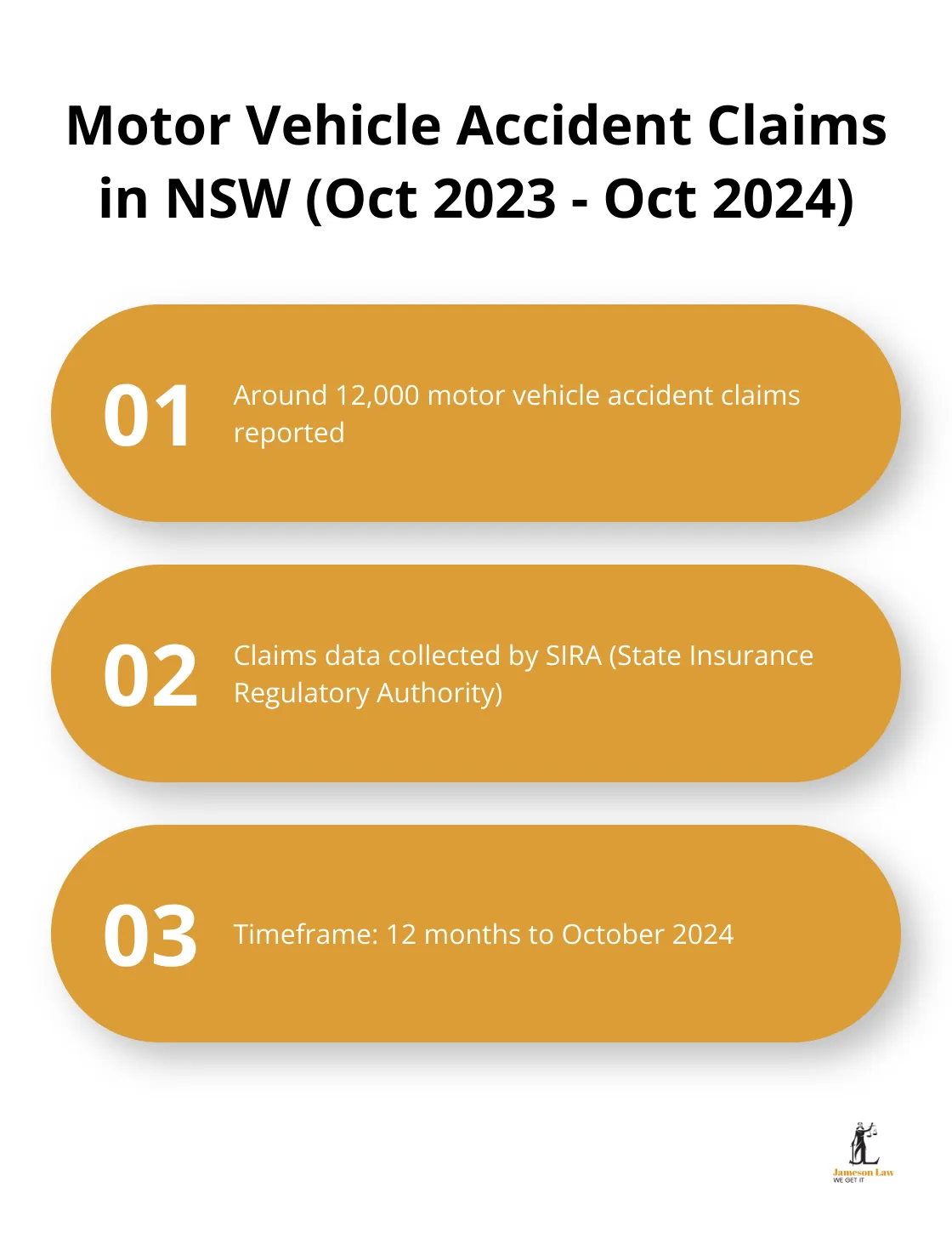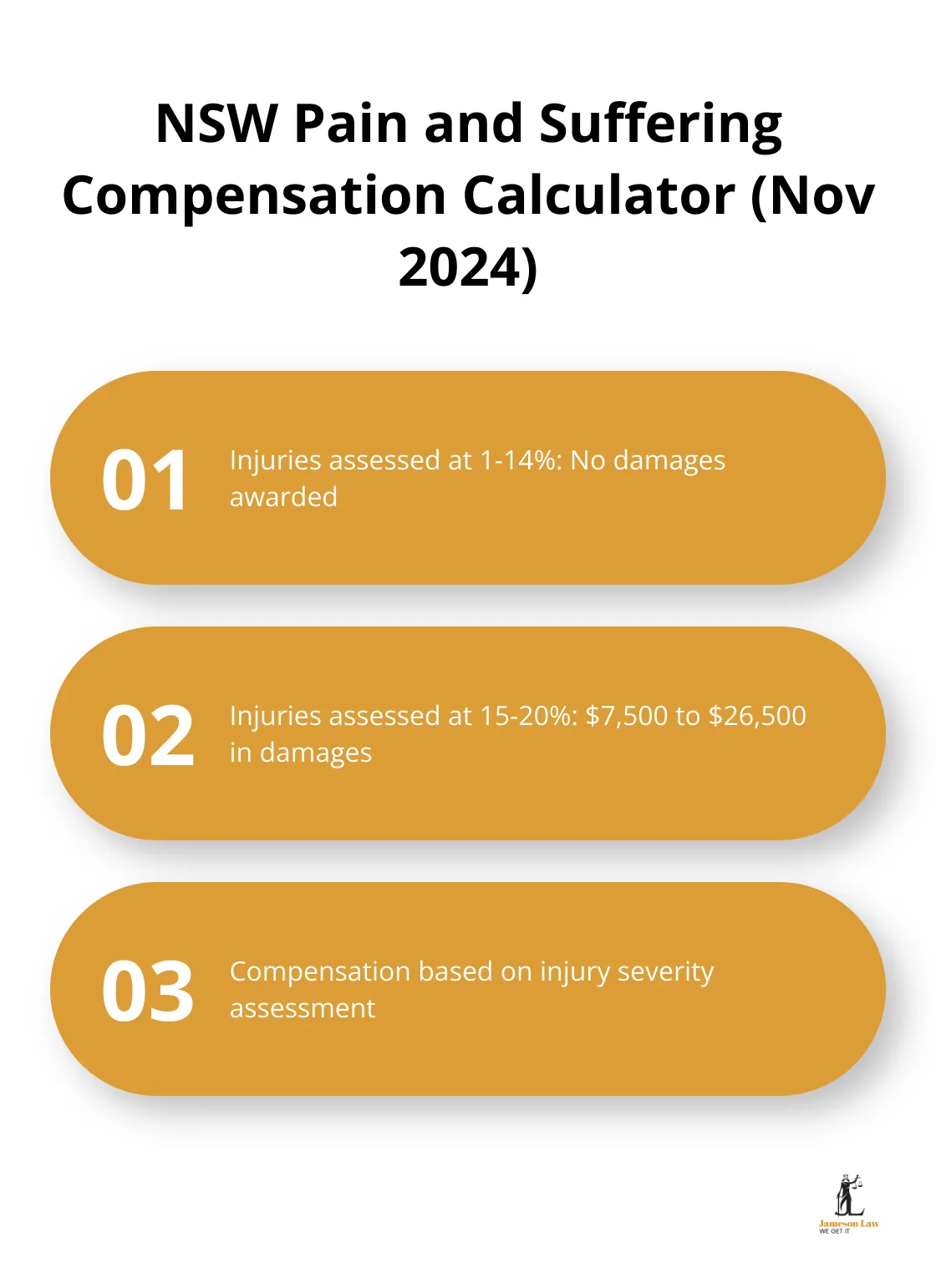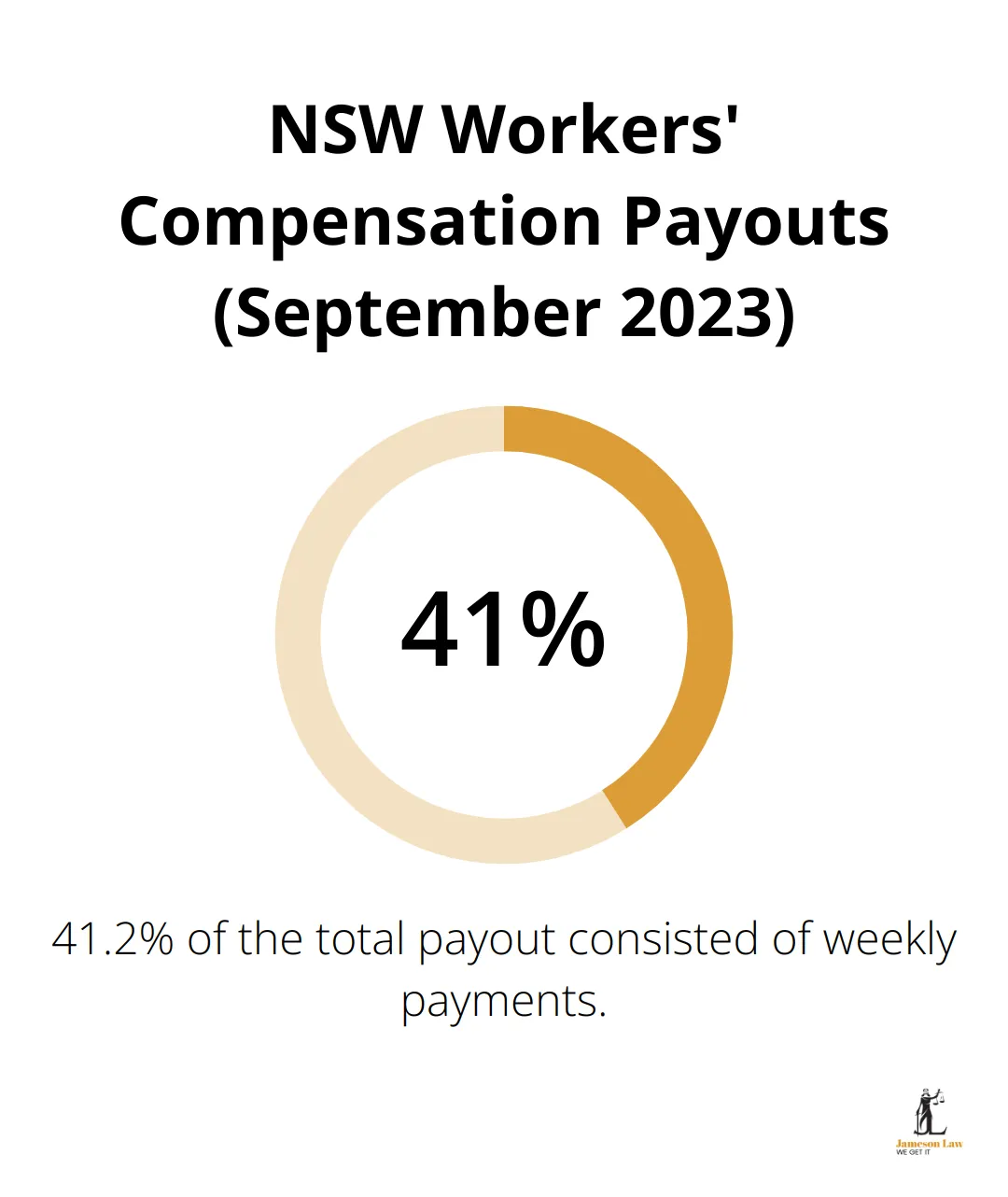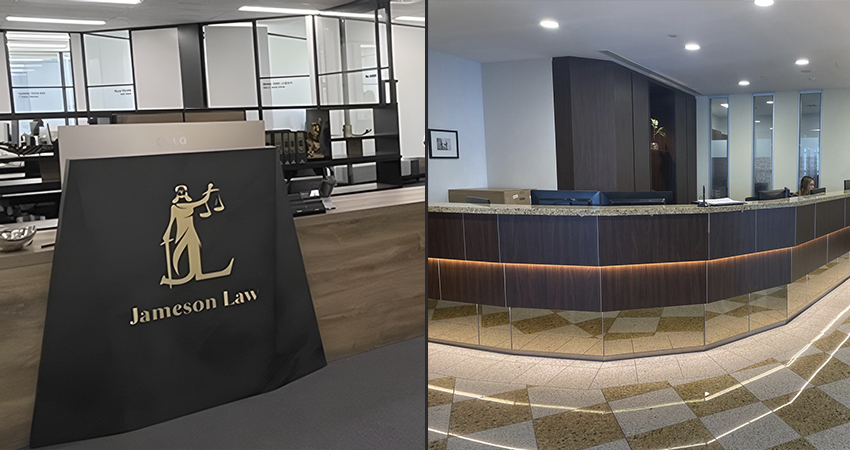Personal injury claim payouts can vary significantly based on numerous factors. Understanding these factors is crucial for anyone seeking compensation after an accident or injury.
At Jameson Law, we’ve seen firsthand how the right approach can make a substantial difference in the outcome of a claim. This post will explore the key elements that influence compensation amounts and provide insights into typical payouts for various types of personal injury cases.
What Impacts Your Personal Injury Compensation?
Personal injury compensation varies greatly based on several key factors. At Jameson Law, we understand how these elements shape the final payout. Let’s examine the main components that influence your compensation.
Severity of Injuries
The extent of your injuries plays a significant role in determining compensation. More severe injuries typically result in higher payouts. For example, spinal cord injuries leading to paralysis often yield much larger settlements compared to simple fractures. Benefits may include the payment of hospital, medical and rehabilitation expenses as well as income support. Additional compensation may be available through various channels.
Medical Expenses
Your compensation should cover all injury-related medical costs (immediate treatment, ongoing care, and potential future medical needs). It’s essential to keep all receipts and medical records as evidence. According to SIRA (the State Insurance Regulatory Authority), in the 12 months to October 2024, around 12,000 motor vehicle accident claims were reported in NSW.

Income Loss and Future Earnings
Injuries that affect your ability to work allow you to claim lost wages and reduced earning capacity. For long-term or permanent disabilities, this can form a substantial part of your claim. The Australian Bureau of Statistics reported a median weekly earnings of $1,835 for full-time workers in May 2024 – use this figure as a starting point to calculate your losses.
Quality of Life Impact
Courts consider how your injury affects your daily life, including your ability to enjoy hobbies or care for your family. These factors contribute to non-economic damages, often termed “pain and suffering”. According to SIRA, $125,000 was paid out for every new claim reported in NSW in the 12 months to October 2024.
Age and Health History
Younger claimants often receive higher payouts due to longer projected loss of earnings. However, pre-existing conditions can complicate claims. It’s important to be transparent about your medical history, as concealing information can reduce your compensation.
While these factors provide a general guide, only a thorough assessment by an experienced personal injury lawyer can give you a realistic estimate of your potential compensation. The next section will explore the different types of damages you can claim in personal injury cases.
Types of Damages in Personal Injury Claims
Personal injury claims in Australia encompass various types of damages. Understanding these categories will help you grasp the full scope of compensation you might be entitled to. Let’s explore the main types of damages and what they cover.
Economic Damages: Quantifiable Financial Losses
Economic damages compensate for financial losses due to an inability to work, both past and future. These include:
- Medical Expenses: Costs related to hospital stays, treatments, and ongoing care.
- Lost Wages: Compensation for income lost due to time off work.
- Property Damage: This covers repair or replacement costs for any personal property damaged in the incident.
Non-Economic Damages: Compensation for Intangible Losses
Non-economic damages address the subjective, non-monetary impacts of your injury:
- Pain and Suffering: This compensates for physical discomfort and emotional distress resulting from your injury.
- Loss of Enjoyment of Life: If your injury prevents you from engaging in activities you previously enjoyed, you may receive compensation for this loss.
- Loss of Consortium: This applies to the impact on your relationships, particularly with a spouse or partner.
In New South Wales, non-economic damages are subject to a pain and suffering compensation calculator updated in November 2024. For injuries assessed at 1-14%, no damages are awarded, while injuries assessed at 15-20% may receive between $7,500 and $26,500.

Punitive Damages: Deterring Negligent Behaviour
Punitive damages are less common in Australian personal injury cases but can be significant when awarded. They serve to punish the wrongdoer and deter similar behaviour in the future. These damages typically apply only in cases of gross negligence or intentional wrongdoing.
A notable example occurred in 2019 when a Victorian Supreme Court jury awarded $180,000 in punitive damages (in addition to $400,000 in compensatory damages) in a medical negligence case.
Understanding these damage types is essential when pursuing a personal injury claim. It ensures you seek full and fair compensation for all aspects of your injury. However, the complexities of personal injury law can be challenging to navigate alone.
As we move forward, let’s examine the average compensation amounts for common personal injury cases to give you a clearer picture of what you might expect from your claim.
How Much Can You Expect for Common Personal Injury Cases?
Personal injury compensation amounts vary widely based on the specific circumstances of each case. Understanding average payouts for common types of personal injury claims can provide a general idea of what to expect. This chapter explores typical compensation ranges for various personal injury scenarios in Australia.
Motor Vehicle Accidents
Motor vehicle accidents represent one of the most common types of personal injury claims. Car accident injury compensation payouts can vary significantly. For the first 13 weeks after an accident, claimants may receive 95% of their pre-accident earnings. From weeks 14 to 52, this amount typically ranges between 80-85% of pre-accident earnings.
Minor injuries like whiplash might result in payouts from $10,000 to $100,000, while severe injuries such as spinal cord damage or traumatic brain injuries can lead to settlements in the millions. In NSW, claimants must prove a permanent impairment of at least 11% for physical injuries (or 15% for psychological injuries) to qualify for certain compensation payouts.
Workplace Accidents
Workplace accident claims in Australia typically fall under workers’ compensation schemes. According to recent data, workers’ compensation payouts in NSW totaled $467.2M in September 2023 alone, with 41.2% of this amount consisting of weekly payments.

More serious workplace injuries can result in substantially higher compensation. Total and Permanent Disability (TPD) payouts often range between $60,000 and $300,000 (with many exceeding $200,000). In NSW, claimants with a whole person impairment (WPI) greater than 15% caused by employer negligence may receive an additional lump sum for work injury damages.
Slip and Fall Injuries
Slip and fall injuries, which fall under public liability claims, can result in a wide range of compensation amounts. Minor injuries might lead to payouts of a few thousand dollars, while more severe injuries can result in six-figure settlements. A slip and fall resulting in a broken hip could potentially yield a payout between $150,000 and $300,000, depending on the impact on the person’s life and earning capacity.
Medical Malpractice
Medical negligence cases often result in higher compensation amounts due to the potential for severe, long-lasting impacts. While average figures can mislead due to the wide range of possible scenarios, medical malpractice payouts often reach six or seven figures. A report from a specific health district showed an average compensation payout for medical negligence of over $650,000 (though this is considered a high figure).
Product Liability Cases
Product liability cases can result in significant compensation, especially if the defective product caused widespread harm. While individual payouts vary, class actions in this area have resulted in multi-million dollar settlements. A recent class action against a medical device manufacturer resulted in a $300 million settlement for thousands of Australian women affected by faulty pelvic mesh implants.
These figures represent general averages, and every case is unique. Factors such as injury extent, impact on quality of life, and loss of earning capacity all play significant roles in determining the final compensation amount. Expert legal representation often leads to higher settlements, as experienced lawyers know how to build strong cases and negotiate effectively with insurers.
Final Thoughts
Personal injury claim payouts can significantly vary based on numerous factors. The potential for substantial compensation emphasizes the importance of professional legal guidance. An experienced personal injury lawyer will provide an accurate assessment of your claim and ensure you don’t overlook any potential areas of compensation.
At Jameson Law, we strive to help our clients secure the compensation they deserve. Our team combines extensive expertise with a deep understanding of Australian personal injury law. We offer a No Win No Fee policy for plaintiff personal injury claims (making quality legal representation accessible to all).
Your specific case may yield a different result based on its unique factors. It’s essential to consult with a qualified personal injury lawyer who can provide a realistic assessment of your claim’s potential value. With the right legal support, you can focus on your recovery while we work to secure the compensation you need.








